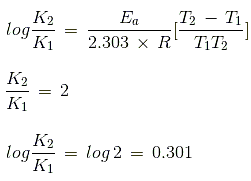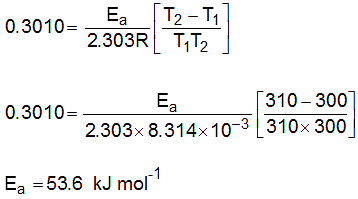JEE Exam > JEE Questions > The rate of a reaction doubles when its temp...
Start Learning for Free
The rate of a reaction doubles when its temperature changes from 300 K to 310 K. Activation energy ( in kJ mol-1) of such a reaction will be:
(R = 8.314 JK-1 mol-1 and log 2 = 0.301) (Nearest integer)
Correct answer is '54'. Can you explain this answer?
| FREE This question is part of | Download PDF Attempt this Test |
Most Upvoted Answer
The rate of a reaction doubles when its temperature changes from 300 ...


≈ 54 KJ mol-1
Free Test
FREE
| Start Free Test |
Community Answer
The rate of a reaction doubles when its temperature changes from 300 ...
Given information:
- The rate of a reaction doubles when the temperature changes from 300 K to 310 K.
- Activation energy (Ea) = ?
- R = 8.314 J K-1 mol-1
- log 2 = 0.301
Formula:
The rate constant (k) of a reaction can be calculated using the Arrhenius equation:
k = A * e(-Ea/RT)
where:
- k is the rate constant
- A is the pre-exponential factor or the frequency factor
- Ea is the activation energy
- R is the gas constant
- T is the temperature in Kelvin
Approach:
1. Use the given information to find the ratio of rate constants (k2/k1) at two different temperatures.
2. Use the Arrhenius equation to express the ratio of rate constants in terms of temperature and activation energy.
3. Solve the equation to find the value of activation energy (Ea).
Solution:
Let's assume the rate constant at 300 K is k1 and at 310 K is k2.
Step 1: Finding the ratio of rate constants
The rate of a reaction is directly proportional to the rate constant. Therefore, the ratio of rate constants can be calculated as follows:
k2/k1 = 2
Step 2: Expressing the ratio of rate constants in terms of temperature and activation energy
Using the Arrhenius equation, we have:
k2/k1 = e(-Ea/R) * (1/T2 - 1/T1)
Substituting the given values:
2 = e(-Ea/8.314) * (1/310 - 1/300)
Step 3: Solving the equation to find the activation energy (Ea)
Taking the natural logarithm of both sides of the equation:
ln(2) = -Ea/8.314 * (1/310 - 1/300)
Rearranging the equation to solve for Ea:
Ea = -8.314 * ln(2) / (1/310 - 1/300)
Ea ≈ 54 kJ mol-1 (rounded to the nearest integer)
Conclusion:
The activation energy (Ea) of the reaction is approximately 54 kJ mol-1.
- The rate of a reaction doubles when the temperature changes from 300 K to 310 K.
- Activation energy (Ea) = ?
- R = 8.314 J K-1 mol-1
- log 2 = 0.301
Formula:
The rate constant (k) of a reaction can be calculated using the Arrhenius equation:
k = A * e(-Ea/RT)
where:
- k is the rate constant
- A is the pre-exponential factor or the frequency factor
- Ea is the activation energy
- R is the gas constant
- T is the temperature in Kelvin
Approach:
1. Use the given information to find the ratio of rate constants (k2/k1) at two different temperatures.
2. Use the Arrhenius equation to express the ratio of rate constants in terms of temperature and activation energy.
3. Solve the equation to find the value of activation energy (Ea).
Solution:
Let's assume the rate constant at 300 K is k1 and at 310 K is k2.
Step 1: Finding the ratio of rate constants
The rate of a reaction is directly proportional to the rate constant. Therefore, the ratio of rate constants can be calculated as follows:
k2/k1 = 2
Step 2: Expressing the ratio of rate constants in terms of temperature and activation energy
Using the Arrhenius equation, we have:
k2/k1 = e(-Ea/R) * (1/T2 - 1/T1)
Substituting the given values:
2 = e(-Ea/8.314) * (1/310 - 1/300)
Step 3: Solving the equation to find the activation energy (Ea)
Taking the natural logarithm of both sides of the equation:
ln(2) = -Ea/8.314 * (1/310 - 1/300)
Rearranging the equation to solve for Ea:
Ea = -8.314 * ln(2) / (1/310 - 1/300)
Ea ≈ 54 kJ mol-1 (rounded to the nearest integer)
Conclusion:
The activation energy (Ea) of the reaction is approximately 54 kJ mol-1.
Attention JEE Students!
To make sure you are not studying endlessly, EduRev has designed JEE study material, with Structured Courses, Videos, & Test Series. Plus get personalized analysis, doubt solving and improvement plans to achieve a great score in JEE.

|
Explore Courses for JEE exam
|

|
Similar JEE Doubts
The rate of a reaction doubles when its temperature changes from 300 K to 310 K. Activation energy ( in kJ mol-1) of such a reaction will be:(R = 8.314 JK-1 mol-1 and log 2 = 0.301) (Nearest integer)Correct answer is '54'. Can you explain this answer?
Question Description
The rate of a reaction doubles when its temperature changes from 300 K to 310 K. Activation energy ( in kJ mol-1) of such a reaction will be:(R = 8.314 JK-1 mol-1 and log 2 = 0.301) (Nearest integer)Correct answer is '54'. Can you explain this answer? for JEE 2024 is part of JEE preparation. The Question and answers have been prepared according to the JEE exam syllabus. Information about The rate of a reaction doubles when its temperature changes from 300 K to 310 K. Activation energy ( in kJ mol-1) of such a reaction will be:(R = 8.314 JK-1 mol-1 and log 2 = 0.301) (Nearest integer)Correct answer is '54'. Can you explain this answer? covers all topics & solutions for JEE 2024 Exam. Find important definitions, questions, meanings, examples, exercises and tests below for The rate of a reaction doubles when its temperature changes from 300 K to 310 K. Activation energy ( in kJ mol-1) of such a reaction will be:(R = 8.314 JK-1 mol-1 and log 2 = 0.301) (Nearest integer)Correct answer is '54'. Can you explain this answer?.
The rate of a reaction doubles when its temperature changes from 300 K to 310 K. Activation energy ( in kJ mol-1) of such a reaction will be:(R = 8.314 JK-1 mol-1 and log 2 = 0.301) (Nearest integer)Correct answer is '54'. Can you explain this answer? for JEE 2024 is part of JEE preparation. The Question and answers have been prepared according to the JEE exam syllabus. Information about The rate of a reaction doubles when its temperature changes from 300 K to 310 K. Activation energy ( in kJ mol-1) of such a reaction will be:(R = 8.314 JK-1 mol-1 and log 2 = 0.301) (Nearest integer)Correct answer is '54'. Can you explain this answer? covers all topics & solutions for JEE 2024 Exam. Find important definitions, questions, meanings, examples, exercises and tests below for The rate of a reaction doubles when its temperature changes from 300 K to 310 K. Activation energy ( in kJ mol-1) of such a reaction will be:(R = 8.314 JK-1 mol-1 and log 2 = 0.301) (Nearest integer)Correct answer is '54'. Can you explain this answer?.
Solutions for The rate of a reaction doubles when its temperature changes from 300 K to 310 K. Activation energy ( in kJ mol-1) of such a reaction will be:(R = 8.314 JK-1 mol-1 and log 2 = 0.301) (Nearest integer)Correct answer is '54'. Can you explain this answer? in English & in Hindi are available as part of our courses for JEE.
Download more important topics, notes, lectures and mock test series for JEE Exam by signing up for free.
Here you can find the meaning of The rate of a reaction doubles when its temperature changes from 300 K to 310 K. Activation energy ( in kJ mol-1) of such a reaction will be:(R = 8.314 JK-1 mol-1 and log 2 = 0.301) (Nearest integer)Correct answer is '54'. Can you explain this answer? defined & explained in the simplest way possible. Besides giving the explanation of
The rate of a reaction doubles when its temperature changes from 300 K to 310 K. Activation energy ( in kJ mol-1) of such a reaction will be:(R = 8.314 JK-1 mol-1 and log 2 = 0.301) (Nearest integer)Correct answer is '54'. Can you explain this answer?, a detailed solution for The rate of a reaction doubles when its temperature changes from 300 K to 310 K. Activation energy ( in kJ mol-1) of such a reaction will be:(R = 8.314 JK-1 mol-1 and log 2 = 0.301) (Nearest integer)Correct answer is '54'. Can you explain this answer? has been provided alongside types of The rate of a reaction doubles when its temperature changes from 300 K to 310 K. Activation energy ( in kJ mol-1) of such a reaction will be:(R = 8.314 JK-1 mol-1 and log 2 = 0.301) (Nearest integer)Correct answer is '54'. Can you explain this answer? theory, EduRev gives you an
ample number of questions to practice The rate of a reaction doubles when its temperature changes from 300 K to 310 K. Activation energy ( in kJ mol-1) of such a reaction will be:(R = 8.314 JK-1 mol-1 and log 2 = 0.301) (Nearest integer)Correct answer is '54'. Can you explain this answer? tests, examples and also practice JEE tests.

|
Explore Courses for JEE exam
|

|
Suggested Free Tests
Signup for Free!
Signup to see your scores go up within 7 days! Learn & Practice with 1000+ FREE Notes, Videos & Tests.
























